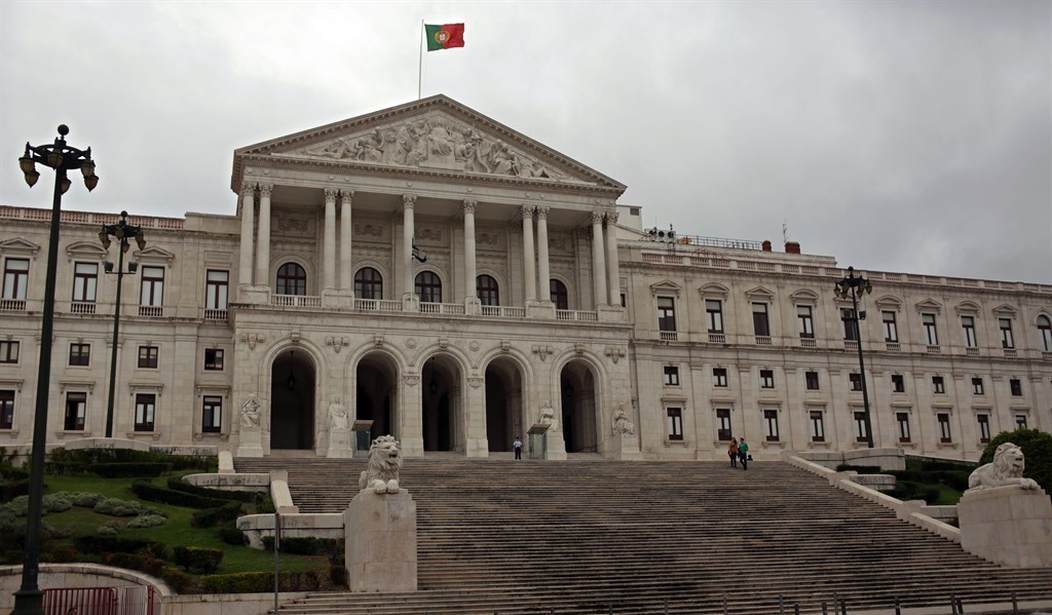Will Portugal once again succumb to the ravages of Big Debt?
Big Debt is not just an economically strangling burden, it is debt that increases because it lacks political discipline.
For some three years, Portugal's coalition government, led by Prime Minister Pedro Passos Coelho, exhibited just the kind of calculated economic discipline and political guts it takes to first curb and then begin to defeat Big Debt. In 2011, Big Debt damaged Portugal. Lisbon got the Greek Disease. Its economy shrank by almost two percent. The country had to beg for an international bailout.
Under Passos Coelho's guidance, that changed. Portugal became the anti-Greece. Passo Coelho's Christian Democrats and its coalition partner, the Portuguese Social Democratic Party (PSD), committed themselves to remaining in the Eurozone and EU. To remain meant reforming Portugal's economy and --ultimately-- paying down debt. They formed an alliance, Portugal Ahead (PaF).
The Eurozone's productive economies insisted debt-plagued Eurozone members reform or leave. By fits and starts, Germans, Frenchmen and even Italians provided discipline. Italians complained that Greek government worker pensions were more lavish than theirs. "Don't fund your retirement on our money and retire better than we will!" Such common sense secured support for fiscal discipline in Paris, Rome and Berlin.
Portugal's coalition got the message. It implemented unpopular but financially astute policies. The coalition constantly reminded Portuguese citizens that remaining in the Eurozone meant curbing government services, cutting pensions, raising taxes and improving tax collection.
These are the policies that angry Greek demonstrators demonize as austerity. The Austerity Demon is a very powerful propaganda tool.
Recommended
But glory be. The coalition program brought success. Portugal's bond rating left the junkyard. The so-called Troika (European Commission, European Central Bank and International Monetary Fund) ended its economic oversight program.
Meanwhile, back in Athens: the same old economic stagnation and political finger-pointing.
In the Oct. 4 national election, however, Passos Coelho paid a price at the polls. The Austerity Demon's propaganda power played a role.
Passo Coelho's party base won the biggest chunk of the vote (38 percent), which translated into 104 of parliament's 230 seats. Close but not enough. It takes a majority to form a government. The Socialist Party (PS) finished second with 85 seats.
Since the election Passos Coelho and PS leader Antonio Costa have discussed a new power-sharing arrangement. However the PS is feeling the allure of power and -- perhaps -- a sudden nostalgia for welfare socialism. Costa opined that the election indicated people were tired of -- here it is -- austerity.
Costa is discussing a left-wing coalition. Two hard-left parties, the Communists and Left Bloc (Bloco de Esquerda), control enough seats to give Costa a majority.
Costa supporters are arguing that they are "better positioned" to form a stable government and respond to political and market "uncertainty" generated by the unsettled election. That may be true in the short term but it is also self-serving and ironic. Many investors fear that a government without Passos Coelho in charge will return to welfare-state largesse. He temporized socialist fantasy.
The PS has many fundamental disagreements with the Communists and Left Bloc. The hard leftists oppose Eurozone economic rules and demand Portugal leave NATO. As this column goes to press, a report appeared that the leftists are willing to drop these positions. That sounds like an old-time communist tactical promise, a promise that will be broken once power is obtained.
Which may be why several key PS leaders, like Francisco Assis, oppose a coalition with the Communists and Left Bloc. They regard confrontation with the Eurozone's leading nations and withdrawal from NATO as foolishness. Assis told media a PS coalition with the hard left is "absurd." Supporting the European Union and the Eurozone are fundamental PS policies.
A PS and left-wing coalition could return Portugal to the malaise of 2011. The interim work and sacrifice would go for nothing.
There is a media lesson here. Until the election 10 days ago, Lisbon's tough policy choices and hard work garnered little notice. Yet those policies are the sort that seed positive long-term economic gain, the kind of change that brings real hope.
























Join the conversation as a VIP Member